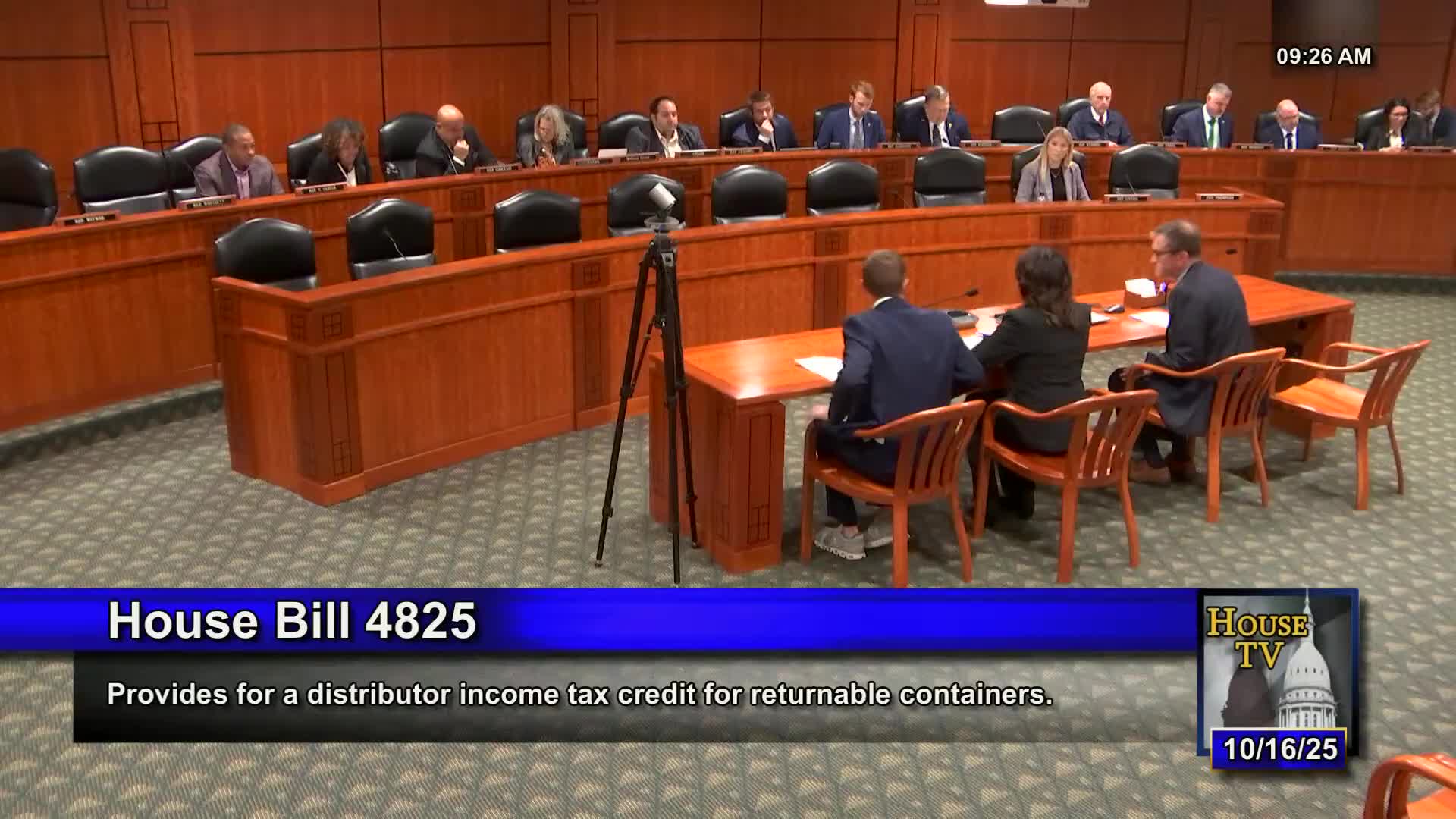Committee hears proposal to create tax credit for bottle-bill distributors to offset operating costs
October 17, 2025 | 2025 House Legislature MI, Michigan
This article was created by AI summarizing key points discussed. AI makes mistakes, so for full details and context, please refer to the video of the full meeting. Please report any errors so we can fix them. Report an error »

The committee heard testimony on House Bill 48 25, a proposal to create individual and corporate income tax credits for distributors that originate deposits on beverage containers to offset the costs of operating Michigan’s bottle-deposit system.
Representative Whitworth framed the proposal as compensation for distributors who pick up, transport, clean, process and recycle returnable containers after they are returned to stores. Brett Visner of the Michigan Beer and Wine Wholesalers Association told the committee distributors handle roughly 70% of containers processed through the statewide system and that distributors collectively spend more than $60 million a year operating the program, a figure he said predates pandemic-related cost increases. Visner described capital investments—warehouse space, crushing and sorting equipment, and new facilities—that distributors fund to process returned containers.
Derek Badgemau of the Michigan Beverage Association and other witnesses said the original bottle-bill structure directed unclaimed deposits (the unreturned 10-cent deposits) to distributors until legislative changes shifted most of those funds to the Michigan Department of Environment, Great Lakes, and Energy (EGLE) and to retailers. Witnesses said the change in 1989 reduced distributor reimbursement and that prior tax credits under the Michigan business tax (pre-2011) had partially offset costs.
The bill would provide a half-cent tax credit per container, which witnesses estimated would amount to roughly $20 million annually statewide and would cover a portion (about one-third by their estimate) of present-day operating costs. Witnesses said the $60 million figure likely understates current costs because it was estimated before inflation and pandemic supply-chain impacts. Committee members asked about where unclaimed deposits currently flow, how returned containers that are not accepted by return-vending machines are handled, and how proceeds from nonreturned deposits are used by EGLE. Witnesses said that exact downstream flows and uses involve state budget decisions and EGLE allocations and that traceability outside the collection system is limited.
No committee vote was recorded on HB 48 25 in this hearing; the bill received testimony and multiple stakeholders listed their support in the hearing record.
Ending: Committee took testimony and listed supporters; no committee action was recorded at this session.
Representative Whitworth framed the proposal as compensation for distributors who pick up, transport, clean, process and recycle returnable containers after they are returned to stores. Brett Visner of the Michigan Beer and Wine Wholesalers Association told the committee distributors handle roughly 70% of containers processed through the statewide system and that distributors collectively spend more than $60 million a year operating the program, a figure he said predates pandemic-related cost increases. Visner described capital investments—warehouse space, crushing and sorting equipment, and new facilities—that distributors fund to process returned containers.
Derek Badgemau of the Michigan Beverage Association and other witnesses said the original bottle-bill structure directed unclaimed deposits (the unreturned 10-cent deposits) to distributors until legislative changes shifted most of those funds to the Michigan Department of Environment, Great Lakes, and Energy (EGLE) and to retailers. Witnesses said the change in 1989 reduced distributor reimbursement and that prior tax credits under the Michigan business tax (pre-2011) had partially offset costs.
The bill would provide a half-cent tax credit per container, which witnesses estimated would amount to roughly $20 million annually statewide and would cover a portion (about one-third by their estimate) of present-day operating costs. Witnesses said the $60 million figure likely understates current costs because it was estimated before inflation and pandemic supply-chain impacts. Committee members asked about where unclaimed deposits currently flow, how returned containers that are not accepted by return-vending machines are handled, and how proceeds from nonreturned deposits are used by EGLE. Witnesses said that exact downstream flows and uses involve state budget decisions and EGLE allocations and that traceability outside the collection system is limited.
No committee vote was recorded on HB 48 25 in this hearing; the bill received testimony and multiple stakeholders listed their support in the hearing record.
Ending: Committee took testimony and listed supporters; no committee action was recorded at this session.
View full meeting
This article is based on a recent meeting—watch the full video and explore the complete transcript for deeper insights into the discussion.
View full meeting
